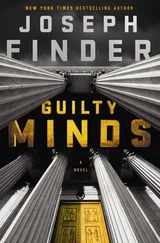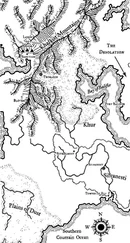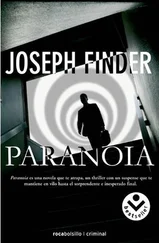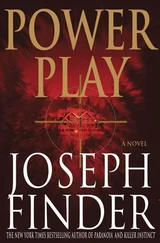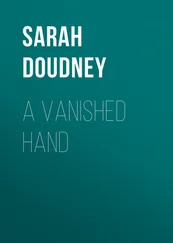Easy.
I’d already determined my route, based on which parts of the compound seemed to be deserted at night and which weren’t. There was no way to be sure I wouldn’t be seen by someone who happened to be wandering the grounds at two thirty in the morning, or maybe just standing around smoking, but it was the best route I could devise, with the lowest probability of being spotted. Nothing was certain, of course. But nothing in life is certain.
Carrying the folding ladder and my duffel bag, I looped around the driving track, where there was no one. Then past the airstrip. Adjacent to that was a helipad, well marked with a big white H painted on the concrete and recessed landing lights, though the lights were off. No helicopter was expected that night.
A landscaped path wandered by the trainees’ mess hall, which was dark, then a smaller building that apparently served as the dining hall for VIPs and Paladin executives, which was also dark. If the Paladin compound were a military base, which it resembled, that would have been the officers’ club.
Here the path forked, the left fork leading to the barracks where the trainees bunked. A few lights were still on there. Some of the trainees kept late hours, and I couldn’t risk being seen. I took the right fork, which meandered past a man-made pond, bordered by ornamental grasses and flowers. Definitely more country club than army base.
Up ahead loomed Granger’s lodge. I stopped behind a cluster of trees where the path bent so I could observe unseen. The house was surrounded by thick, waist-high hedges: too low for privacy. Probably to delineate a border, a sort of moat. A line beyond which you dared not cross. In front of the house was a white-gravel parking area. When you walked over it, your footsteps would crunch audibly. The only vehicle parked here was a black Hummer.
I went closer, then crouched down behind the Hummer and watched the house for a few minutes. The only light on was in the front room, probably where the interior guard was stationed during Granger’s sleeping hours. I plugged an earphone into the Bearcat scanner and listened for transmissions. There weren’t any.
A guard was making a long, slow, counterclockwise circuit around the lodge. He was smoking a cigarette, toting a machine gun, and looking bored.
I didn’t envy the guard his job, protecting a paranoid shut-in during the small hours of the night. He couldn’t read, couldn’t listen to music, and had no one to share the tedium with.
Then again, some of his colleagues were working in various death zones around the world, so maybe he had the better gig. Boredom was generally better than death or mutilation.
But boredom makes you less alert. You’re likely to tune out, get distracted, let your mind wander. You expend all your mental energy trying to stay awake and get through your shift.
I hoped that was the case here.
Somehow I had to approach the house undetected. I also needed at least three minutes. Ideally, five. That wasn’t likely to happen, not with a guard constantly circling the property.
I removed a cell phone from my pocket, switched it on, and slid it behind the Hummer’s rear tire. When the guard had rounded the southeast corner of the lodge, I made my move, taking long quiet strides, from time to time ducking beneath the hedges when I thought I might have moved into the guard’s peripheral vision. Then, when he’d circled around the back of the lodge and disappeared around the northwest corner, I stepped over the hedge, hoisted the ladder and duffel bag after me, and ran to the kitchen entrance.
I looked at my watch.
I had around sixty seconds before the guard circled around again and spotted me. Maybe a bit less. I took out a second cell phone and dialed the first one.
A few seconds later, I could hear the phone ringing. Even at this distance, the sharp trill pierced the stillness.
Before setting down the ladder, I hooked up the earpiece of the radio scanner again and heard: “Alpha Three to Alpha Two.”
“This is Alpha Two.”
“You hear that? Sounds like a… phone, huh?”
“I don’t hear nothin’.”
“It’s out here somewhere. Out in front. I’m gonna go check it out.”
The disturbance was irresistible, of course. Just as I hoped it might be.
After five rings, I disconnected the call.
At both the front and the back of the lodge were entrance porches with wood-shingled shed roofs, lower than the roof of the main building. That made it easy to climb to the second story. I set up the ladder against the peeled-log exterior wall and started to climb, and I heard in my earpiece:
“Alpha Two to Alpha Three.”
“Alpha Three here.”
“What’d you find?”
“Nothing.”
“You think someone dropped a phone, maybe?”
“I don’t know. I’m coming back in.”
“Back in” probably meant back on his circuit. Which meant he’d be here in forty-five seconds.
As I clambered onto the roof of the porch, I hit redial, and I heard the faint ringing from the other side of the lodge.
“Ahh, dammit, there it is again,” I heard in my earpiece.
“I hear it now. You check the porch?”
“Nah, it’s farther out there.”
I chose a second-floor window that had remained dark at night. It seemed the safest point of entry.
“Alpha Three, I still hear it.”
“Yeah, me, too. I’m lookin’.”
That bought me another minute at least.
I switched off the cell phone to stop the ringing. I wanted him to look but not find it. From my duffel bag I pulled out a glass cutter and suction device, set them down on the flat of the roof outside the window.
But I saw no alarm contacts and the window slid right up.
The screen was unlocked, too, and I managed to slide that open.
Then I pulled the ladder up after me, folded it, and set it on the floor of the darkened room.
And then I entered the house in search of Allen Granger.
Gabriel,” Kozak said, softly, coaxing, “you don’t want to be responsible for mutilating your own mother, do you? Put that toy down.”
Gabe snarled, “ You goddamned -” and there was a loud pop and Kozak, anticipating the shot, sidestepped, and the thing shot out of the Taser, the metal probes striking the granite kitchen island, trailed by a silvery filament, click-click-clicking.
And Lloyd Kozak lurched forward, quick as a rattlesnake striking, grabbing her son, while she screamed again, the high, desperate, choked cry, tears blurring her vision, and she knew it was over, the whole terrible nightmare was ending, and this sadist would-
“Police!” barked a voice. Another voice.
A whole bunch of them, blue-clad policemen in her kitchen, weapons drawn. The one who knocked Kozak to the floor, a knee to Kozak’s throat, was older than the others, a man with thick glasses she recognized from the hospital room so long ago. Not much more than a week ago, though it seemed much longer.
“WHO PUNCHED in the duress code?” Arthur Garvin asked.
“Me,” Gabe said.
“You did good, kid,” Garvin said. “Saved your mom’s life.”
Gabe nodded.
“We need to get your mom to the emergency room. Get a doc to take a look at that cut on her eye. Probably need stitches.”
The emergency medical guys had bandaged the slice under her eye, which stanched the flow of blood. It no longer hurt. Her mouth hurt more, actually, from where they’d ripped off the duct tape.
“Was he in the house when you got home?” Garvin asked, meaning Kozak.
She shook her head. “He called and asked if he could come over. Who is he?”
“He works for Paladin.”
Yes, she thought. Paladin. She knew it was only a matter of time.
Читать дальше

